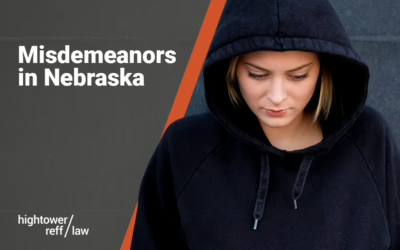 A felony warrant turns your world upside down. Not only are your freedom and your future on the line, if it’s your first arrest, you’ll have no idea what to expect. This criminal law blog series will give you the basic information you’ll want to know if you or a loved one is facing a criminal charge in Nebraska.
A felony warrant turns your world upside down. Not only are your freedom and your future on the line, if it’s your first arrest, you’ll have no idea what to expect. This criminal law blog series will give you the basic information you’ll want to know if you or a loved one is facing a criminal charge in Nebraska.
In this installment, we cover the decision to appeal (or not) a ruling in your case. In a felony case, you may have received a stiff sentence that will affect your life for many years, so it’s important to weigh your appellate options early and thoroughly. You have a lot to lose if you don’t.
Can you even appeal it?
The first thing to figure out is if you even have grounds for an appeal. One of the biggest misunderstandings people generally have about the appeals process is the idea that you can appeal a ruling in your case because you don’t like it. This isn’t true. There has to be a legal reason for the appeal. Legal reasons include violation of Due Process, insufficiency of the evidence, technical issues of law (jury instructions, evidence admissibility, experts), and excessive sentence.
Figuring out whether there are appealable issues in your case can be complicated. It’s good to have the advice of a trusted attorney to guide you in this part of the decision before you waste a lot of time and money on an appeal the court may see as frivolous — and ultimately will dismiss.
It’s Not a Do-Over
Another common misunderstanding comes from a belief that an appeal is an opportunity for a new trial or sentencing hearing. Not so. During an appeal, the appellate court reviews the information the trial court had in front of it when it made its ruling. You won’t get a chance to present new evidence.
In an appeal, the appellate court will only consider the record of the trial court and the appellate briefs submitted by the parties. Both the appellant (formerly called the defendant) and the prosecuting attorney will have the opportunity to file briefs. The appeals court may also allow oral argument, which it would also consider in its decision.
How Pleas Affect Your Right to Appeal
Entering a plea doesn’t necessarily mean you give up the ability to appeal. You may still be able to appeal certain constitutional and statutory claims like ineffective assistance of counsel, excessive sentence and sentencing based on race.
This list isn’t exhaustive, there may be other issues you can appeal as well. Like many other aspects of appeals, this part can be complicated. Your best bet is to have a lawyer guide you.
Time Is Not on Your Side
As soon as your sentence is pronounced, the clock starts ticking on filing your notice of appeal. If you don’t file within the time limit imposed by law, you will not be able to appeal, so it’s important that you don’t wait and that you quickly get legal advice from a criminal law attorney experienced in appeals.
The limited time you have to file your appeal may not even be your biggest reason to make your decision quickly. Appeals are not speedy. They can take months, or even years and, depending on your case, you may sit in jail the entire time your appeal is pending. The faster you get it filed and move forward, the faster you will have a resolution.
Get Help Early
The best thing you can do if you are accused of a felony (or any crime) is to get experienced legal help from the beginning. My power to help you as a lawyer can be lessened if my client has done something to damage his or her case before I get involved.
If you need help with a felony or other criminal matter, contact Hightower Reff online, or call us at 402-932-9550.
This article should not be construed as legal advice. Situations are different and it’s impossible to provide legal advice for every situation without knowing the individual facts.



